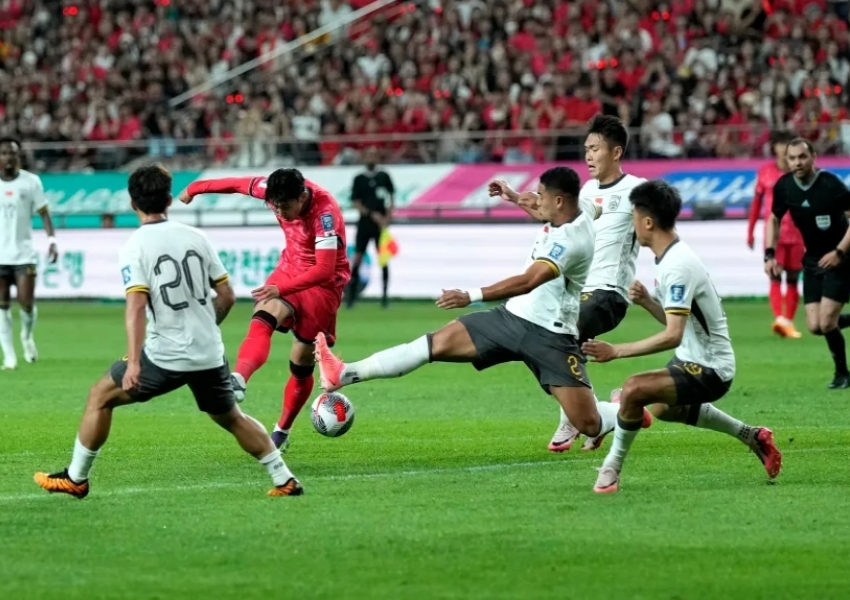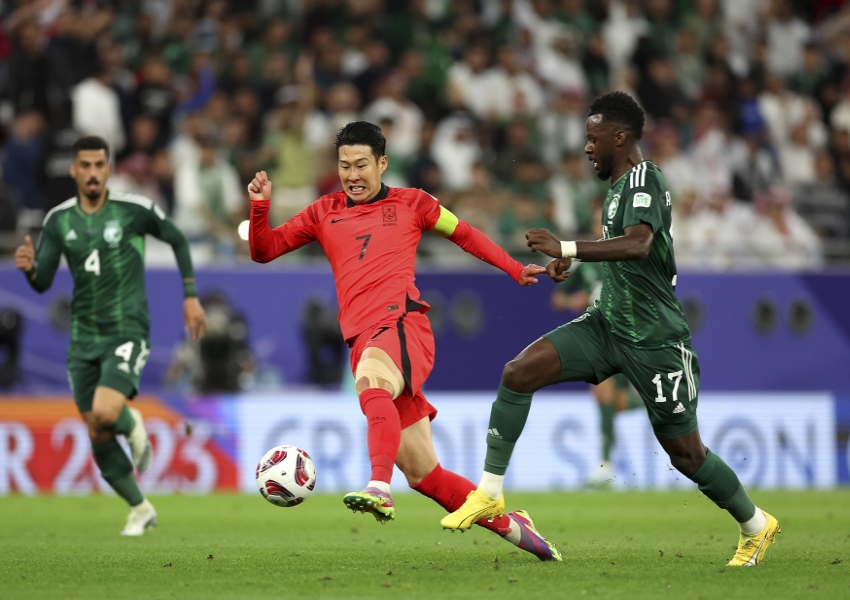AFC Asian Qualifiers: China Can Accept a Modest Defeat, Saudi Arabia Eyes a Big Win
On September 5, the Asian qualifiers for the 2026 World Cup will kick off, and the Chinese national football team has found itself in a group where merely securing fourth place would be considered a success. In their opening match, China faces the group's strongest team, Japan, away from home. As long as they play to conserve energy and avoid unnecessary risks, the result may not turn out too embarrassing. Meanwhile, Saudi Arabia, determined to secure a direct qualification spot, will aim to score as many goals as possible in their first match against a relatively weaker Indonesia.

Japan vs. China: Steady Is the Game Plan
Amid mixed emotions, Chinese fans are once again gearing up for a national team match. The announcement of an expanded World Cup format has only deepened the curiosity of Chinese football enthusiasts for the world’s most prestigious football tournament. After all, the Chinese national team has qualified for the Asian top 12 in the last two World Cup cycles, so there’s every reason to hope that a broader World Cup could open new doors.

However, the rapid decline in the performance of the Chinese team has caught everyone by surprise. Their lackluster display in the AFC Asian Cup earlier this year, where they failed to score a single goal, was a telling indicator. Yet, back then, at least the defense looked relatively stable, a result of Shanghai Shenhua's improvement in recent years. Zhu Chenjie and Jiang Shenglong demonstrated their ability to keep foreign forwards at bay, and Jiang Guangtai, with his more comprehensive skill set, deserved his place in the starting lineup.

However, in the World Cup qualifiers, China no longer has the luxury of a steady defense, and defensive errors have begun to emerge frequently. Zhang Linpeng and Liu Yang have been heavily criticized by fans, and Zhang Linpeng, also known as "Brother Zhang," was so disheartened by the backlash that he chose to leave the national team. Fortunately, Wu Lei has remained a reliable presence; his two goals helped China secure a 4-1 home victory over Singapore, laying a solid foundation for their qualification campaign. Indeed, it was largely thanks to Singapore's help that China advanced, but the four points earned against direct competitors Thailand were ultimately the decisive factor. In their final match against South Korea, the opponents graciously limited themselves to just one goal. Son Heung-min may not have been very friendly to Chinese fans who traveled to Seoul, but considering the offensive remarks he likely heard, it’s understandable that he later expressed that he shouldn't have to tolerate such behavior at his home stadium.
On the pitch, China became even more conservative after conceding a goal. Fang Hao, who had been subbed in for only ten minutes, was dispossessed by Son Heung-min, demonstrating a level of skill and attitude that is unlikely to earn respect from opponents. While China was awarded a 3-0 victory by default in their away match against North Korea, Japan’s flawless five-win, no-conceded-goal record in the group stage to qualify for the top 18 was still nothing short of incredible. The Japanese team's group stage opponents were too weak, and combined with their deep talent pool, Japan rotated more than half of their lineup in nearly every match. For them, winning was not the priority; avoiding injuries that could affect their club commitments was far more important.
As they enter the top 18, Japan will no longer be as casual with their squad rotations. With three teams in this group having qualified for the last World Cup, and only two direct qualification spots available, the competition will be intense. In their first game, Japan’s main objective will be to secure a steady win; they are likely to play at only 20% of their full strength at home, while China’s offensive capabilities leave much to be desired.
Saudi Arabia vs. Indonesia: Goal Difference Matters
While the Saudi league has been increasingly in the spotlight, the Saudi national team's performances have been far less impressive. They were knocked out in the first round of the knockout stages in the AFC Asian Cup earlier this year. Losing to South Korea may have been understandable, but the draw against Thailand in the group stage left many fans frustrated. The Saudi Football Federation has restricted players from moving abroad, opting instead to bring in high-caliber foreign players. Unlike last season, Saudi clubs have started to sign young, talented players who are not yet global stars, signaling their intent to use naturalization as a strategic tool, much like Qatar did before them.
Could Saudi Arabia be planning a similar path, relying on naturalized players to achieve a breakthrough? Meanwhile, Indonesia finds itself up against two familiar foes in the second-round group stage — Vietnam and Iraq — both of whom were in their Asian Cup group earlier this year. True to form, Indonesia lost to Iraq but defeated Vietnam. Seeing Vietnam, a team that has often dominated China, get defeated 3-0 at home by Indonesia is certainly food for thought for Chinese fans.
One of the key reasons for Indonesia's significant progress has been naturalization. Their main lineup includes four naturalized players, but unlike China, Indonesia’s naturalized players are young and have been successfully integrated into the team's overall tactical system. In contrast, China's naturalized players and domestic players often play at completely different paces, resulting in a lack of cohesion.
In their opening match against a weaker team, Saudi Arabia must go all out to secure a big win and boost their goal difference. They are expected to play at 30% of their full capacity, while Indonesia is unlikely to deliver a standout performance.
China's Modest Approach and Saudi Arabia's Ambition
As China prepares to face Japan in their opening game, their primary objective will be damage control. Facing the strongest team in their group, the Chinese side would be wise to focus on maintaining a solid defense and conserving energy. A heavy defeat might seem inevitable given the disparity in talent, but a modest loss would be considered a small victory. The Chinese team is in a transitional phase, and expectations remain low, especially against a team of Japan's caliber.
For Saudi Arabia, the situation is quite different. They are looking to make a statement in their opening match against Indonesia. Their performance in the Asian Cup raised doubts about their current form, and there is pressure to prove that they are still one of Asia’s top teams. Given the competitive nature of their group, every goal will matter, and they will likely approach the game with full intensity.
As the Asian qualifiers kick off, both China and Saudi Arabia find themselves at different points on the competitive spectrum. China is managing expectations, aiming for a respectable showing, while Saudi Arabia is aggressively chasing goals and points to ensure they stay on course for direct qualification. The opening matches will set the tone for both teams' campaigns, and the stakes couldn't be higher.
Copyright Statement:
Author: mrfootballer
Source: Mrfootballer
The copyright of this article belongs to the author. Reproduction is not allowed without permission.
Recommended Blog
- Premier League Matchday 3: Brighton's New Tactics Enhance Mitoma’s Efficiency, Norway's Absence Benefits Manchester City
- Inter Milan's Sharpshooter Brings Joy and Hope to the Team
- Serie A Round 3: Inter Milan Showcases New Signings, Torino Sets an Attacking Tone
- Premier League Round 3 Preview: Chelsea's Striker Problem Solved? Spurs Defenders Stealing the Show?
- Inter Welcomes Back Alexis Sanchez to Positive Reviews, Declines 101-Goal, 52-Assist Forward in Move that Raises Questions
- Europa League Playoff First Leg: Ajax in Rebuilding Phase, Saint-Gilloise Ready for Another Surprise?
- Inter Milan's Chance to Revive Former MVP as De Vrij Emerges After a Year of Silence
- U.S. Open Cup Semifinals: Messi and Inter Miami Aim for Another Trophy While Real Salt Lake Looks to Regain Form
- Champions League Playoff Preview: PSV Eindhoven Seeks Redemption, Can Antwerp Follow Their Coach's Lead?
- The Truth Behind Lautaro's "Lone Wolf" Controversy: The Real Reason Behind Inter's Forward Overhaul
Hot Blog
- Man City’s 21-Year-Old Star Returns Home as a Hero! Receives $350,000 Mercedes, Gifts It to His Father
- AFC Champions League Quarterfinal Draw: Yokohama Faces CR7! Two High-Stakes Clashes as Japan’s Duo Battle in the Bottom Half
- 175 Days on the Sidelines! Barça’s 32-Year-Old Guardian Dreams of a Champions League Comeback
- English Media: Manchester United Will Win Premier League Title in 2028! History Will Repeat Itself, Two Teams Serve as Inspirations
- 4 AM Showdown: Barcelona's Revenge Match! Win = 3-Point Lead Over Real Madrid, Key Players Rested
- 0-2 Double Defeat! China National Team Stuck at 6 Points: No More Direct World Cup Hopes, Two Crucial Matches Ahead
- China National Football Team Drops 13.6 Points, Slips to 94th in FIFA Rankings: Syria Overtakes, New 9-Year Low
- 0-0 Draw! Japan 12 Shots, 2 Missed One-on-Ones: 8 Matches, 20 Points, Group Winner, Saudi Arabia Stuck at 10 Points in 3rd
- 4-1, Double Win Over Brazil! Argentina Celebrates: World Cup Qualification Secured, 4th Team Globally to Qualify
- Real Madrid Got Lazy: 7 Kilometers Less Running in UCL! Two Superstar Spectators While Barça Outruns Them All